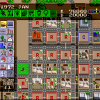Did that influence your approach to games? Montessori education is about learning through play and experience and your games seem to echo that idea.
WW: Yes, I think it did, in a number of ways. It became more overt, more conscious to me later in life, as I got interested in Maria Montessori and her theories, and went back and started reading and studying the whole movement. You know, she represents one part of what’s generally referred to as constructivist education. There were people before her like [Friedrich] Fröbel, who was a German teacher who invented these things called Fröbel Blocks. He invented the whole concept of the kindergarten. But he was approaching it with a very constructivist, “Let’s give toys that are creative to kids, and let them play and learn geometry and math.” But even since then, there are people like Alan Kay or Seymour Papert, the people applying sort of constructivist approaches to education through technology. I think of my games kind of like that. Really I’d much rather: (a) rather than educate somebody I’d rather inspire or motivate them, get them interested in the subject, and (b) I think that self-directed learning is far more powerful than if you lead somebody on a leash. (via Gamasutra – Features – The Replay Interviews: Will Wright)
